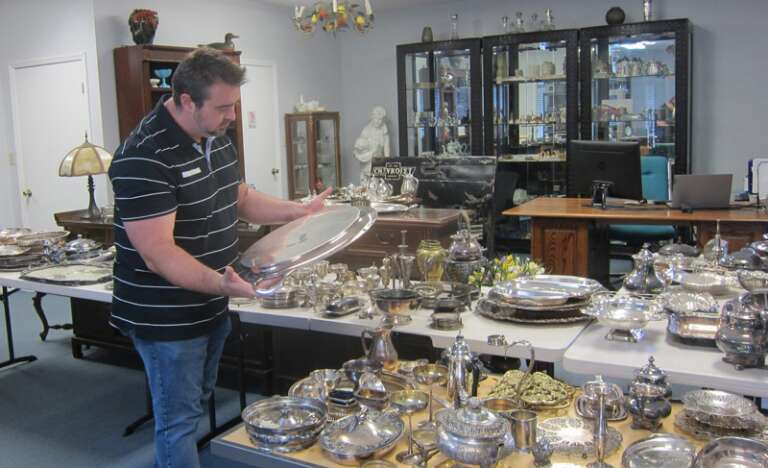What Is an Estate Liquidator? (All You Need To Know)
Are you seeking to have an estate sale of your own? If you have many items, you may wonder if it’s better to do it yourself or hire an estate liquidator. We recommend that you employ the services of an estate liquidator.

Liquidators gather all the moving parts from an estate sale and put them together. They are certified specialists with extensive experience in the field who can handle all duties efficiently for your next estate sale.
This article will explain everything you need to know about an estate liquidator’s job, including what they do, how they get paid, and where to find one to organize your next sale.
If you’re considering running an estate sale, we suggest you visit one first to get an idea of what to expect. Doing so will give you first-hand knowledge and see why liquidation sales are a cost-effective way to sell large volume of items. Keep reading to learn more.
Estate Sales and How they Operate
If you’re considering liquidating, we recommend you go to a skilled professional estate liquidation company first to understand what to expect.
On average, the estate liquidator and the seller follow a similar pattern when arranging and conducting their sales. The typical sale format is as follows:
- The sale is held on location both inside the home and across the property
- The sale can take place from two to three days
- Personal items (typically a family member’s) must be sold to pay school expenses
- Try to include as many individually priced and displayed items as you can
- Make sure it’s open to the public
- Unsold goods should be disposed of as soon as possible
- Following the sale, a realtor may list the property
Why Should You Have an Estate Sale?
A real estate agent may buy personal items from family members who have just lost a loved one so the home can be sold.
The individual’s belongings may be sold due to his or her mental illness. Will or trust procedures may force this to happen.
Complete sales are a cost-effective approach to selling and displaying the home’s entire contents of a deceased loved one estate sale’s home.
Other reasons for holding a sale include bankruptcy, divorce settlement, and job relocation. In different situations, the homeowner may quit or go into assisted living.
It’s also possible they are selling or downsizing to a smaller house with fewer upkeep needs.
Why Should You Hire an Estate Liquidator?
Estate sales are more challenging to organize than garage sales. Clients contact estate liquidators for various reasons, but the most common is their experience. Estate liquidators have the expertise necessary to handle this intricate sale.
Liquidators may know to evaluate a wide range of goods and household items. The liquidator displays them in various rooms to pique the customers’ interest and encourage them to buy.
When dealing with customers, estate sales usually employ more salespeople and may hire security personnel if the sale involves precious goods.
The liquidator promotes the sale in various ways, and because of their professional connections, they reach many customers. This allows them to quickly sell a large number of products.
At the sale, the liquidator addresses any concerns. The estate liquidator may contact local auctions to list items. After completing the transaction, they handle large paid-for goods and may send other items to buyers.
Finally, the liquidator guarantees that any remaining unsold items are removed from the property.
What Does a Liquidator of Estates Do?
The sale is overseen by a liquidator (or estate liquidation firm), a person or firm that handles selling real property. A professional estate sale firm usually offers a variety of liquidation services. Pre-sale, sale-day, and post-sale activities are examples of services available.
1. Pre-Sale Tasks To Do
The liquidator thoroughly examines every item in your loved one’s possessions and belongings before the estate sale. Each estate sale item is assessed, appraised, and priced by professionals.
When valuing estate sale items, the liquidator frequently does Google searches and looks at ebay online auction sold listings. Where items are liquidated, the liquidator will contact local auction houses about exquisite art and unique objects that might bring significant amounts of money at the sale.
The liquidator promotes the sale to encourage a large turnout at the sale event. The estate sale business will likely run newspaper classified advertisements, advertise the deal on their social media pages, and send email notifications to their followers. They’ll also put up prominent street signs to entice daring consumers.
A great estate liquidation business also has current sales on its website and advertising. The most famous estate sale websites are EstateSales.org and EstateSales.net, which have over 10 million page views monthly. They maintain a searchable database from New York to Florida to California.
Before the liquidation begins, valuers give each sale item a price tag. Because almost everything across the estate has a price tag, an estate sale is commonly known as a “tag sale” or a “moving sale.” Before allowing potential buyers inside, the liquidator tastefully displays the home’s contents in liquidating an estate.
2. Sale-Day Tasks To Do
On the day of the sale, the estate sale liquidator keeps a close eye on everything. The liquidator, also in charge of circulation throughout the premises, employs an onsite staff that may include salespeople and perhaps security personnel.
If you had an estate auction during the Coronavirus epidemic, the estate liquidator addresses that COVID-19 safety measures were in place.
The staff of the sale business answers consumers’ questions about the items on sale. Customers pay for their finds after staff members have verified their authenticity.
Cashiers must also calculate sales tax, operate a cash register, and process their credit cards at check out (if applicable).
3. Post-Sale Tasks To Do
This type of sale is not the same as a garage sale. Some items are not sold during an estate sale; instead, the entire contents must be destroyed as part of an estate liquidator’s duty. It’s time to get rid of everything.
Whether they give them to charity, sell off the stuff at upcoming estate sales, or toss them in the rubbish, nothing is allowed.
Next, the estate liquidator frequently undertakes a house cleanout. The cleanup is usually included in the estate sale costs, but it may be an extra service.
The estate liquidator can allow for immediate pick up of big, paid-for “sold” items. Staff members may, for a fee, transport items to other locations.
Finally, the estate liquidator will provide the seller with a “sold Items” list after the sale. The estate sale liquidator’s service fees will be deducted from the seller’s revenue when he or she receives the sale’s proceeds.
What A liquidator Isn’t and What He OR She Is Not Doing
An estate liquidator is typically a veteran in the field of liquidation. Estate liquidators buy, renovate, and sell houses for a living.
They may run antique shops or operate as licensed auctioneers. Accredited valuers can also become competent representatives.
On the other hand, estate liquidators are not attorneys and cannot give legal guidance regarding estate liquidation sales.
They’re also not referees who can assist with disputes between numerous purchasers over the same collectibles.
Finally, remember that family members may be experiencing stressful personal circumstances as they prepare to sell a loved one’s belongings. Inheritance liquidators are, of course, sympathetic to the problem. They are not trained therapists and do not have the tools to deal with emotional issues.
How Do Estate Liquidators Get Paid?
You do not pay the estate sale company directly as a seller. Instead, they receive a percentage of the total sale price. Typical estate sale service charges, also known as commissions, range from 30 to 40 percent.
Naturally, the liquidator and the seller benefit when goods sell for the most significant possible sums.
There are several Estate Sale Commission Structures
The usual percentage for estate liquidators is 10%. You must choose the correct one if you want your price to reflect a lot of work and time sellers spend organizing an estate sale.
They typically personally assess the estate to see how much work is involved in preparing for and conducting the sale. A well-organized house, for example, will not require as much pre-sale preparation as a home filled with clutter.
At the same time, the liquidator considers the return they will receive for their time investment. Before deciding on a commission rate, the estate liquidator balances both variables.
Several estate liquidators utilize sliding-scale commission rates. The commission percentage decreases as the gross sales amount rises, and vice versa.
A few estate liquidators charge a fixed commission rate for all of their estate sales. This percentage is calculated based on the amount sold, regardless of size or complexity.
Although this approach does not require any assumptions, it does not compensate liquidators for estate sales that need a lot of extra effort.
Estate sale firms also offer services such as notifying relevant authorities, preparing inventories of items to be sold, and advertising the estate sale on their websites for an additional fee.
An example is after-sales cleaning, such as trash removal and disposal of large unsold items like pianos. When dealing with estate liquidators, ensure you understand any extra sale-related costs.
Inquire how much the most recent clients of the liquidator paid for particular services.
Ways of Finding an Estate Liquidator
Finding the appropriate estate liquidations expert should be simple. Begin by soliciting referrals from the estate sales of your family, friends, and coworkers. Referrals from happy clients are coveted just as much as gold since they are based on favorable outcomes.
Next, for additional information, check online, where you can search for local estate sales. When you contact someone, be ready to get a lot of calls or emails back immediately.
Offer prospective employees an interview at your home before the sale begins. Present the items for sale during the meeting and review your sales procedures.
Determining whether or not to use an estate liquidator
Evaluating an estate liquidator is complicated; you’ll need some detective work. Request a minimum of three client testimonials from the liquidator’s most recent estate sales, which is to be expected in the industry.
Contact the references to discover how the estate sale went. Then, if time allows, visit several of the liquidator’s sales and assess their overall performance. Additionally, you may contact local auction houses too.
It’s critical to note that the business lacks regulatory requirements. However, the American Society of Estate Liquidators (ASEL) has created its code of ethics.
If a liquidator is a member of ASEL, they have committed to following several ethical standards when conducting their business.
Consider whether your estate liquidator is a member of the ASEL and review the organization’s standards.
Next, look through the Better Business Bureau (BBB) complaints and client opinions from popular internet review sites.
Determine whether the candidate has industry certifications or has completed the necessary education to be more effective in their current roles.
Finding the Best Estate Liquidator is Crucial.
Choosing the appropriate liquidator might be difficult, but it is undoubtedly worthwhile.
When you discover someone who respects your loved one’s belongings while running a sale smoothly, you’ve got everything necessary for a successful event. Contact us today!
We are located at 830 Eyrie Dr, Suite 1030, Oviedo, FL 32765
(407) 529-6952
www.busbyestates.com







